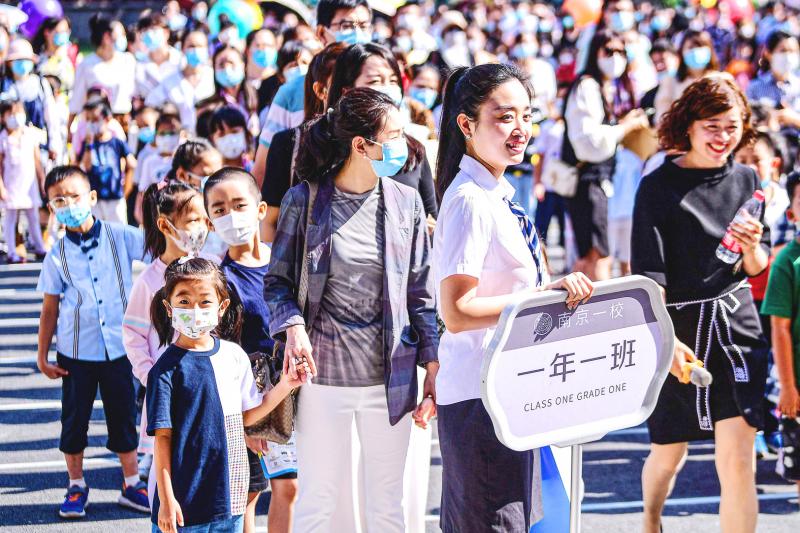Beijing yesterday banned written exams for six and seven-year-olds, as part of sweeping education reforms aimed at relieving pressure on pupils and parents in China’s hyper-competitive school system.
China’s exam-oriented system previously required students to take exams from Grade 1 onward, culminating in the feared university entrance exam at age 18 known as the gaokao (高考), where a single score can determine a child’s life trajectory.
“Too frequent exams ... which cause students to be overburdened and under huge exam pressure,” have been axed by the Chinese Ministry of Education, new guidelines released yesterday said.

Photo: AFP
The ministry said that pressure on pupils from a young age “harms their mental and physical health.”
The regulations also limit exams in other years of compulsory education to once a term, with mid-term and mock examinations allowed in junior-high school.
The measures are part of wider government reforms of China’s education sector, which include a crackdown on cram schools — seen by parents as a way to inflate their children’s educational fortunes.
Late last month, China ordered all private tutoring firms to turn non-profit, and barred tutoring agencies from giving lessons in core subjects at weekends and holidays, effectively crippling a US$100 billion sector.
The aim is to reduce China’s education inequality, where some middle-class parents willingly fork out 100,000 yuan (US$15,462) or more per year on private tutoring to get their children into top schools. Many also snag property in schools’ catchment areas, driving up housing prices.
“There is no other country that has such a strong tutoring culture [as China],” said Claudia Wang, partner and Asia education lead at Shanghai-based consulting firm Oliver Wyman.
With population growth at its slowest in decades, Chinese authorities lifted a two-child birth limit earlier this year and plan to increase incentives for parents to have more children.
Beijing city authorities last week announced that teachers must rotate schools every six years, to prevent a concentration of top talent at some schools.
Education officials yesterday reiterated a ban on schools setting up “priority” classes for gifted students.
The ministry also banned written homework for Grade 1 and 2 students earlier this year, and limited homework for junior-high students to no more than 1.5 hours per night.
However, many Chinese parents still regard education as a path to social mobility. The gaokao is one of the few ways that poor, rural students can access better educational opportunities and job prospects at top universities.

Yemen’s separatist leader has vowed to keep working for an independent state in the country’s south, in his first social media post since he disappeared earlier this month after his group briefly seized swathes of territory. Aidarous al-Zubaidi’s United Arab Emirates (UAE)-backed Southern Transitional Council (STC) forces last month captured two Yemeni provinces in an offensive that was rolled back by Saudi strikes and Riyadh’s allied forces on the ground. Al-Zubaidi then disappeared after he failed to board a flight to Riyadh for talks earlier this month, with Saudi Arabia accusing him of fleeing to Abu Dhabi, while supporters insisted he was

The Chinese Embassy in Manila yesterday said it has filed a diplomatic protest against a Philippine Coast Guard spokesman over a social media post that included cartoonish images of Chinese President Xi Jinping (習近平). Philippine Coast Guard spokesman Jay Tarriela and an embassy official had been trading barbs since last week over issues concerning the disputed South China Sea. The crucial waterway, which Beijing claims historic rights to despite an international ruling that its assertion has no legal basis, has been the site of repeated clashes between Chinese and Philippine vessels. Tarriela’s Facebook post on Wednesday included a photo of him giving a

‘MOBILIZED’: While protesters countered ICE agents, Minnesota Governor Tim Walz activated the state’s National Guard to ‘support the rights of Minnesotans’ to assemble Hundreds of counterprotesters drowned out a far-right activist’s attempt to hold a small rally in support of US President Donald Trump’s latest immigration crackdown in Minneapolis, Minnesota, on Saturday, as the governor’s office announced that National Guard troops were mobilized and ready to assist law enforcement, although not yet deployed to city streets. There have been protests every day since the US Department of Homeland Security (DHS) ramped up immigration enforcement in the Twin Cities of Minneapolis and Saint Paul by bringing in more than 2,000 federal officers. Conservative influencer Jake Lang organized an anti-Islam, anti-Somali and pro-US Immigration and Customs Enforcement

NASA on Saturday rolled out its towering Space Launch System (SLS) rocket and Orion spacecraft as it began preparations for its first crewed mission to the Moon in more than 50 years. The maneuver, which takes up to 12 hours, would allow the US space agency to begin a string of tests for the Artemis 2 mission, which could blast off as early as Feb. 6. The immense orange and white SLS rocket, and the Orion vessel were slowly wheeled out of the Vehicle Assembly Building at the Kennedy Space Center in Florida, and painstakingly moved 6.5km to Launch Pad 39B. If the